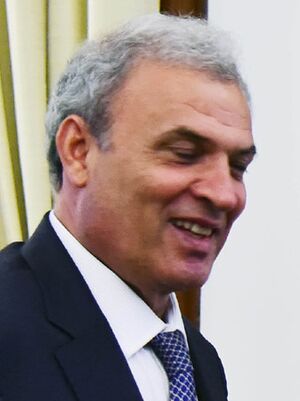Ziad Abu-Amr
( author, politician) | ||||||||||||||||||||||||||||||
|---|---|---|---|---|---|---|---|---|---|---|---|---|---|---|---|---|---|---|---|---|---|---|---|---|---|---|---|---|---|---|
 | ||||||||||||||||||||||||||||||
| Born | 1950 Gaza Strip | |||||||||||||||||||||||||||||
| Nationality | Palestinian | |||||||||||||||||||||||||||||
| Alma mater | • Damascus University • Georgetown University | |||||||||||||||||||||||||||||
Double Bilderberger Palestinian leader who attended Georgetown
| ||||||||||||||||||||||||||||||
Ziad Abu-Amr is a "reform-minded" Palestinian leader who attended the 2005 and 2006 Bilderberg conference.
Contents
Background
Abu Amr was born in 1950 in Gaza City, later he studied at the University of Damascus in Syria, where he received a bachelor's degree in English literature and language. He received a master's and doctorate in Comparative Political Science from Georgetown University in Washington, D.C.[1] After working as a teacher in Bahrain, Oman and Syria, he began teaching political science at Birzeit University in Ramallah in 1985. Abu Amr is married and the father of four children.
Political career
As an independent candidate in the Palestinian parliamentary elections of 1996, he won a seat in the Palestinian Legislative Council (PLC) in Gaza City. During this time he was chairman of the political committee of the PLC.
From April to October 2003 he was Minister of Culture in the government of Prime Minister (later President) Mahmoud Abbas.[2]
In the parliamentary elections on 25 January 2006 he was re-elected.[3]
After a violent confrontation in the Palestinian Territories in the spring of 2007, Hamas member Ismail Hanija became prime minister in a new national unity government with Abu Amr as foreign minister. The Cabinet was confirmed by the PLC on 18 March 2007. In June 2007, Hamas forcibly took control of the Gaza Strip, which led to a split in the Palestinian Territories. On 14 June 2007, Prime Minister Haniyya was dismissed by President Mahmoud Abbas and the government was dissolved. He was succeeded by Salam Fayyad, whose emergency cabinet was sworn in on 17 June 2007.
After negotiations between Hamas and Fatah, a new unity government of the State of Palestine was presented on June 2, 2014, to which Abu Amr belongs as Deputy Prime Minister and Minister of Culture.[4]
He is associated with many political associations, including the Palestine Center in Washington, D.C., the Palestinian Council on Foreign Relations, and MIFTAH, a Palestinian civil rights organization.[5]
Political ideology and views
Abu Amr is considered a "reform-minded" politician and part of the "young guard" of Palestinian leaders. He has, at times, been critical of the Palestinian Authority administration and security services.[5] He has mediated talks between the two main Palestinian factions, Hamas and Fatah, and is widely respected by both groups.[1] A proponent of democracy and democratic elections, he has been a supporter of representation for opposition groups such as Hamas and Islamic Jihad, claiming that they would be held more accountable for their actions.[1]
Events Participated in
| Event | Start | End | Location(s) | Description |
|---|---|---|---|---|
| Bilderberg/2005 | 5 May 2005 | 8 May 2005 | Germany Rottach-Egern | The 53rd Bilderberg, 132 guests |
| Bilderberg/2006 | 8 June 2006 | 11 June 2006 | Canada Ottawa | 54th Bilderberg, held in Canada. 133 guests |
| Munich Security Conference/2017 | 17 February 2017 | 19 February 2017 | Germany Munich Bavaria | The 53rd Munich Security Conference |
References
- ↑ a b c https://www.jewishvirtuallibrary.org/jsource/biography/ZAmr.html
- ↑ https://web.archive.org/web/20031215210945/http://www.jmcc.org/politics/pna/newpagov03.htm
- ↑ https://web.archive.org/web/20080910051529/http://www.elections.ps/pdf/Final_Result_PLC_Dist_Seats_2_En.pdf
- ↑ http://www.jmcc.org/politics/pna/pagovmar07.htm
- ↑ a b https://web.archive.org/web/20070701134832/http://www.manifeste.ch/ziad-abu-amr.htm